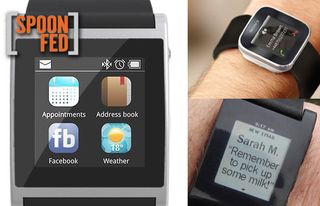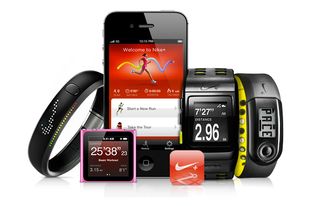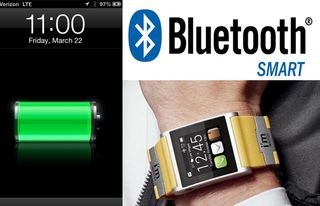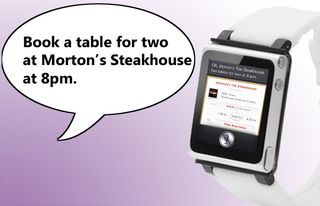5 Reasons You'll Wear a Smartwatch
People don't wear watches anymore. You'll look ridiculous. Why wouldn't you just use your smartphone instead? These are just some of the negative sentiments skeptics are spewing about smart watches, which are still very much in their nascent stage. Guess what? They're wrong.
Not only are there some promising smart watches already available, including the Pebble and Martian Watch, but Samsung has confirmed that it is working on its own watch. Meanwhile, Apple reportedly has more than 100 people working on a curved-glass iWatch that runs iOS and Google is said to be working on its own high-tech timepiece. All of these gadgets have the potential to improve your existence. Here are five reasons why smart watches will be anything but a fad.

You Can Glance at Info to Save Time
With all of the buzzing and beeping your phone does on a daily basis — I've personally come to despise the Galaxy S3's whistle and that awful “Droid” notification sound — a smart watch will let you know at a glance which calls are worth picking up (or ignoring), which messages are worth responding to, which tweets are worth re-tweeting and more. No more having to constantly unlock your phone only to discover that someone has invited you to try “My Birthday Calendar” on Facebook. Still, it will be critical for smart watch makers to let you customize alerts so your wrist isn't buzzing all day.
More: Smartwatches: Why Their Time Has Finally Come

A Smart Watch Can Help You Live Longer
I now wear a Nike Sportswatch for running, and while I love that it uses GPS to track the distance I traveled and my pace, it's too bulky to don all the time. The trick for smart watches will be to provide enough fitness and health-related data to make them useful without being bloated. Apple's iWatch is rumored to feature not only Nike features like a pedometer and calorie counter but also a heart rate monitor. Samsung has already debuted an S Health app for its Galaxy S4 and an accompanying S Band (similar to the Jawbone Up and Fitbit Flex). It's safe to assume a Galaxy Watch would perform similar functions.
More: Top 8 New Fitness Gadgets More:

They Can Extend Your Phone's Battery
How could something that needs your smartphone for connectivity actually extend its endurance? Most smart watches use the Bluetooth 4.0 standard, which employs low-energy technology specifically designed for smart devices. As smartphone screens get bigger, consumers will be looking for ways to make them last longer on a charge. A smart watch could do just that because you'll be using it for a lot of the things you typically glance at your phone for, saving precious juice on your handset.
Stay in the know with Laptop Mag
Get our in-depth reviews, helpful tips, great deals, and the biggest news stories delivered to your inbox.
More: 10 Longest-Lasting Smartphones More:

You'll Be Able to Do More with Your Voice
Even though some smart watches let you make calls from your wrist, I'm not that keen on it because it winds up disturbing everyone around you. I'm more excited about what's possible once you can leverage virtual assistants like Apple's Siri and Samsung's S Voice. With your phone in your pocket, you should be able to dictate a message or social update to your wrist, see who won last night's game and get the 5-day weather forecast. Quick, easy and less annoying to everyone else.
More: 7 Ways to Make Siri Smarter

Smart Watches Are More Discreet Than Phones…and Google Glasses
Say you’re in a meeting or on a date and you want to quickly check your inbox without whipping out your 5-inch phablet. A smart watch would let you do that quickly and more discreetly. Smart watches are also a lot less polarizing than Google Glass, which a Seattle-area bar just banned months before they debut. Yes, it was a publicity stunt, but it certainly won't be the last establishment to outlaw Google's high-tech eyewear. To a certain extent, smart watches are a necessary stepping stone to make other devices like Glass more socially acceptable.
More: Will Google Glasses Make Us Cyborgs?
Editor-in-chief Mark Spoonauer directs LAPTOP’s online and print editorial content and has been covering mobile and wireless technology for over a decade. Each week Mark’s SpoonFed column provides his insights and analysis of the biggest mobile trends and news. You can also follow him on Twitter and Google+.
